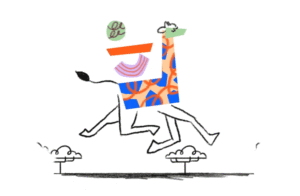A start-up is not a petting zoo
Six pieces of advice for the success of the start-up adventure
It takes a lot of courage, ambition and hard work to start your own business. That’s why Barbara Wegmann has put together some practical lessons for founders and young entrepreneurs.
When you start a business, how do you imagine your workday? Writing 100 emails a day and answering 100 more? Certainly not! But surely your plan includes finding creative solutions to the most stubborn problems and no mountain will seem too high and no challenge too difficult! I would like to tell you a secret about life as an entrepreneur that many companies in the old economy have not yet understood: Creativity is not the opposite of productivity, rather it is its fuel! In order to promote the flow of creative ideas, you must not get caught in the hamster wheel in the first place, or – if you are already caught in it – you should free yourself from it as quickly as possible! Therefore today six pieces of advice from an “old hand” with a lot of love for young ventures.
Index
1. Take your time
Creative problem solving often requires more input than it generates output. But that doesn’t mean that the time invested isn’t productive. Don’t look for the most efficient solution. Take at least one hour a week to let your ideas run wild.
2. Avoid endless task loops
Spend your workday wisely and always keep the bigger picture of your individual projects in mind. My recommendation is to avoid routines and give creativity time!
3. Growth is not the only measure of success
Meaningfulness and appreciation are important, essential influencing factors. Set yourself other, new standards by which you can measure work success! Always think about new approaches to old problems and keep notes and ideas for future projects in an idea book or paper.
4. Don’t turn your company into a lion’s den or a petting zoo.
A good dispute culture is the basis of successful teamwork! Go new ways in the composition of your team and do not simply gather – as it was common in the past – the people in a team who have free capacities at the moment. Your teams should be composed according to the required expert knowledge of interdisciplinary subareas. Of course, the different views and approaches sometimes lead to arguments, but if everyone agreed from the beginning, new, imaginative ideas and creative solutions would never emerge. Learning to argue properly not only increases productivity, but also – at the latest when reconciliation takes place – team cohesion. The role of managers is also changing: You should see yourself as an “enabler” and ensure clear goals, but also a motivating work environment, rewards or praise.
5. Design your workplace so that it becomes a “feel-good” factor
You will quickly notice what is good for your company and what is bad for it. Bad, for example, is “work about work” – that is, the lost time that today, according to McKinsey & Company, 60% of all knowledge workers still spend searching for content, checking emails, and tedious updates on all current projects. Conversely, this means that workers are often left with only 40% of their time to complete the tasks they were originally hired to do. So you’d do well to reduce or completely avoid “work about work” from the start.
6. Find the “flow”
Simply put, you just have to give your “flow” more time to be allowed to develop. People are “in flow” when they are focused and completely absorbed in a kind of creative frenzy. This allows them to perform at their best. Getting into this state is different for everyone and you know best how to get into the “flow”. What is definitely needed to get into this flow and stay in it is to eliminate the rut from your work and embrace new ways of working together. Listening and letting the team co-create a culture themselves is a good step in this direction.
May this advice be your key to more happiness in the workplace! Good luck and success in your endeavor!


Comments are closed.